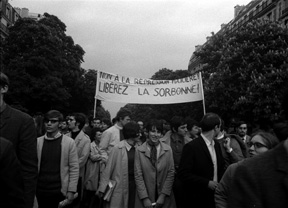In the Intense Now
No Intenso Agora BRAZIL / 2017 / Portuguese / Color, B&W / DCP / 127 min
BRAZIL / 2017 / Portuguese / Color, B&W / DCP / 127 min
Director, Script, Text: João Moreira Salles
Editing: Eduardo Escorel, Laís Lifschitz
Sound Editor: Denilson Campos
Original Soundtrack: Rodrigo Leão
Executive Producer: Maria Carlota Bruno
Archival Producer: Antonio Venancio
Post Producer: Marcelo Pedrazzi
World Sales: VideoFilmes
China at the beginning of the Cultural Revolution, Paris during the May Revolution, Prague at the time of the Soviet invasion: The groups of images that comprise this film—shot by anonymous citizens and documentarians on the streets of multiple countries—record iconic historical scenes of student uprising, conflict between Eastern and Western ideologies, and class struggle. They bring us not only the joy of the people who lived then, their exhilaration and sense of liberation; but also their ultimate demise, anger, and despair. Salles analyzes the fervor of the people displayed in a record of his mother’s 1966 visit to China, and in archival footage from the 1960s, questioning their meaning and the relationship between politics, historical spectacle, and the lives of individuals.
[Director’s Statement] Twelve years ago, as I finished my last film, I happened to come across 16mm reels from a trip my mother had taken to China in 1966. The date had always startled me, since in May of that year Mao had begun the radical and violent process of neutralizing his adversaries. My mother could never have foreseen this when she planned to visit the country as a tourist. The journey had been planned far in advance, and so it was that, with everything paid for and arranged with the authorities, she—a Catholic woman born in a conservative state in the Brazilian heartland—landed in the China of the Great Proletarian Cultural Revolution.
I knew about the trip, but not about the footage. The images struck me as surprising. As the trip progresses, the scenes of multitudes hypnotized by the figure of their charismatic leader vanish from the material, giving way to landscapes, lakes, and objects. Shortly after finding the reels I managed to turn up the piece on the trip that my mother had published in an American magazine. Her writing reinforced the impression I had taken from the images: though from an ideological standpoint China was the polar opposite of my mother, her reaction to the country was not negative. On the contrary, she was moved by it, and she was happy for the month she spent there. She recorded that joy with an intensity that she would come to lose over the rest of her life.
In the Intense Now speaks to the fleeting nature of such moments of great intensity. This personal account leads into a reflection on that period of history, set against images of the events of 1968 in France, Czechoslovakia, and, to a lesser extent, Brazil. These scenes, all from archival footage, not only reveal the state of mind of those filmed—joy, enchantment, fear, disappointment, dismay—but also shed light on the relationship between a document and its political context. How do we film in democratic, authoritarian, or totalitarian regimes? What can one say of Paris, Prague, Rio de Janeiro, or Beijing by looking at the images of the period? Why did each of these cities produce a specific sort of record?
 João Moreira Salles
João Moreira SallesAward-winning Brazilian documentary filmmaker João Moreira Salles began his career writing for the series Japan, a Journey in Time (1985). In 1985, he co-founded VideoFilmes, a film production company that went on to make Central Station (1998), Behind the Sun (2001), and City of God (2002). Salles has directed the documentaries News from a Personal War (1999), an Emmy-winning work on the state of urban violence in Brazil; Nelson Freire (2003), based on the career of the Brazilian pianist and awarded Best Documentary by the Brazilian Film Academy; Intermissions (2004), a behind-the-scenes look at the election of Brazilian President Luiz Inácio Lula da Silva; and Santiago (2007, YIDFF 2015), about an Argentine butler, and also granted the award of Best Documentary by the Brazilian Film Academy. Since 2006, Salles has been the publisher of Piauí, a monthly Brazilian magazine of long form journalism. In the Intense Now premiered at the Berlinale and won three awards at Cinéma du Réel in France.
